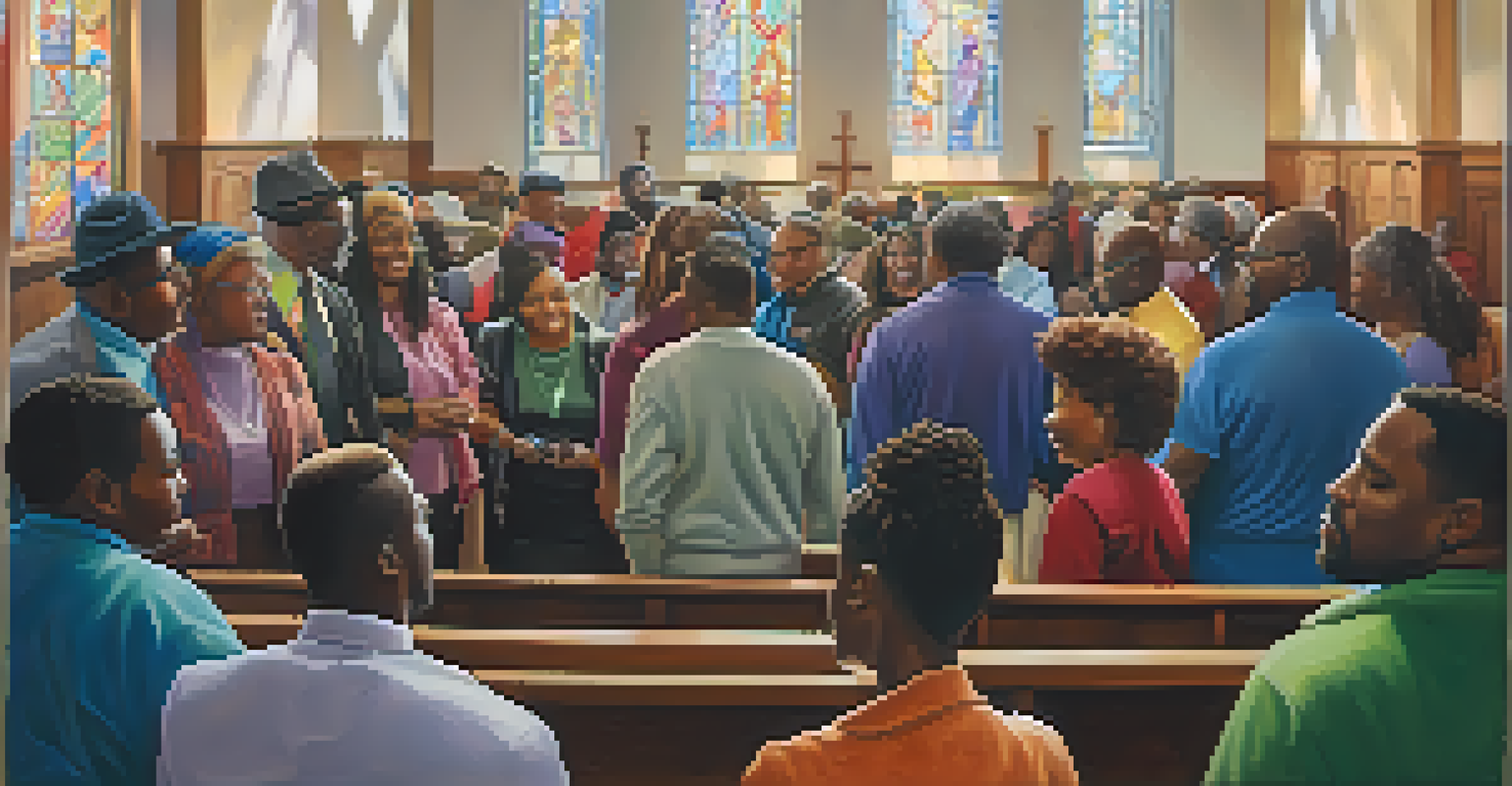Pittsburgh's African American Heritage and Its Lasting Influence

A Brief Overview of African American History in Pittsburgh
Pittsburgh's African American history is a tapestry woven through trials and triumphs. The city became a refuge for many Black families during the Great Migration, drawn by job opportunities in the steel industry. This influx shaped neighborhoods like the Hill District, which became a cultural hub for African Americans. Understanding this history is crucial, as it lays the foundation for the community's resilience and contributions.
Injustice anywhere is a threat to justice everywhere.
In the early 20th century, the Hill District was bustling with jazz clubs, theaters, and social organizations. Notable figures like August Wilson and Billy Strayhorn emerged from this vibrant scene, showcasing the artistic spirit of the community. Their legacies remind us that Pittsburgh was not just a backdrop but a vital player in the national narrative of African American culture.
Today, many organizations strive to preserve this rich history, ensuring that future generations appreciate the roots of their community. Museums, cultural events, and educational programs highlight the achievements and struggles faced by African Americans in Pittsburgh. This ongoing commitment to remembrance and education is essential to keep the spirit of the past alive.
The Impact of the Civil Rights Movement in Pittsburgh
The Civil Rights Movement of the 1960s was a pivotal time for African Americans in Pittsburgh. Local activists fought against segregation and discrimination, leading to significant legal and social changes. Figures like the late Rev. Dr. William H. McMurray and organizations such as the Pittsburgh chapter of the NAACP played vital roles in advocating for equality and justice.

Pittsburgh's response to the movement was marked by both progress and resistance. While many communities rallied for change, others pushed back against the reforms. The tensions during this period illustrate the complexity of advocating for civil rights in a city with deep-rooted racial divides.
Resilient African American Legacy
Pittsburgh's African American history is marked by resilience, cultural contributions, and a commitment to preserving their rich heritage.
Today, the lessons learned from this era continue to resonate. Events like the annual Pittsburgh Black History Month celebrations serve as reminders of the courage and determination of those who fought for change. They also encourage ongoing dialogues about equality, justice, and the work that still lies ahead.
Cultural Contributions: Music and Arts in Pittsburgh
Pittsburgh's African American community has made significant contributions to music and the arts, enriching the city's cultural landscape. The jazz scene, particularly in the Hill District, gave rise to legendary musicians like Art Blakey and Ahmad Jamal. Their innovative styles influenced not just local artists but also shaped the national jazz scene.
The time is always right to do what is right.
Beyond music, African American artists in Pittsburgh have excelled in visual arts, literature, and theater. The August Wilson Center for African American Culture celebrates these contributions, providing a space for artists to showcase their work and connect with the community. This center serves as a beacon of creativity and a testament to the artistic legacy of African Americans in the region.
The ongoing vibrancy of these cultural expressions illustrates the community's resilience and ability to adapt. Events like the Pittsburgh International Jazz Festival highlight the importance of celebrating heritage through the arts. These gatherings not only honor the past but also inspire future generations to continue creating and sharing their stories.
Education and Advocacy: Building a Brighter Future
Education has always been a pillar of the African American community in Pittsburgh. Organizations like the Black Political Empowerment Project strive to ensure that education remains accessible and equitable for all. By advocating for policy changes and community support, they work to dismantle barriers that hinder educational opportunities.
Local schools and universities are also recognizing the importance of inclusive curricula. Programs that focus on African American history and contributions are being integrated into classrooms, fostering a sense of pride and belonging among students. This emphasis on education helps to cultivate future leaders who are well-informed about their heritage.
Civil Rights Movement Impact
Local activists played a crucial role in the Civil Rights Movement, advocating for equality and shaping ongoing dialogues about social justice.
Moreover, mentorship programs connecting youth with successful professionals offer invaluable guidance and inspiration. These initiatives empower the next generation to pursue their dreams, reinforcing the idea that they can achieve greatness. Through education and advocacy, Pittsburgh's African American community is actively shaping a brighter future.
The Role of African American Churches in Community Life
African American churches have historically been the cornerstone of community life in Pittsburgh. These institutions provided not only spiritual guidance but also social services and a sense of belonging. They have been pivotal in mobilizing community members for various causes, from civil rights to education.
Churches like the Allen Cathedral and the Ebenezer Baptist Church have deep roots in the community. They serve as gathering places for worship, fellowship, and activism. The support and resources they offer have helped many navigate personal and societal challenges, reinforcing the communal bonds.
Today, many churches continue this legacy, adapting to meet the evolving needs of their congregations. They offer programs ranging from youth mentorship to health initiatives, demonstrating their commitment to holistic community development. This ongoing role shows that faith and community activism can go hand in hand.
Economic Contributions and Entrepreneurship
The African American community in Pittsburgh has made significant strides in entrepreneurship and economic contributions. Despite historical barriers, many Black-owned businesses have emerged, enriching the local economy and providing jobs. These entrepreneurs often prioritize community-oriented practices, fostering a sense of pride and ownership.
Organizations like the African American Chamber of Commerce of Western Pennsylvania support these businesses by providing resources, networking opportunities, and advocacy. Their efforts are crucial in helping Black entrepreneurs navigate challenges and thrive in a competitive market. This support system enhances the visibility and impact of African American businesses in Pittsburgh.
Future Focused on Education
Education and advocacy are key priorities for Pittsburgh's African American community, fostering future leaders and promoting equitable opportunities.
Furthermore, initiatives aimed at promoting economic equity are gaining traction. Community investment programs and local government support aim to create a more inclusive economic landscape. As the African American community continues to develop its economic influence, it paves the way for future generations to succeed.
Preserving Pittsburgh's African American History
Preserving the rich African American history of Pittsburgh is essential for future generations. Various institutions, like the Heinz History Center and the African American Cultural Center, work tirelessly to document and share this heritage. Their exhibitions and programs educate the public and celebrate the contributions of African Americans to the city.
Community members also play a vital role in preservation efforts. Grassroots initiatives often focus on storytelling, archiving personal histories, and advocating for historical recognition of significant sites. By involving the community in these efforts, a deeper connection to the past is fostered, ensuring that stories are not forgotten.

As the city continues to grow and change, maintaining this historical narrative is crucial. Celebrating anniversaries and milestones within the African American community keeps the history alive and relevant. This commitment to preservation ensures that the legacies of those who came before are honored and remembered.
Looking Ahead: The Future of Pittsburgh's African American Community
As we look ahead, the future of Pittsburgh's African American community is filled with promise and potential. Young leaders are emerging, driven by a desire for change and a commitment to social justice. Their energy and vision are vital in addressing current issues and shaping policies that affect the community.
Collaboration among various organizations enhances the community's ability to tackle challenges. By working together, they can amplify their voices and create a more significant impact. This unified approach is essential in addressing systemic issues such as poverty, education disparities, and access to healthcare.
Ultimately, the strength of Pittsburgh's African American community lies in its resilience and adaptability. By honoring the past and embracing innovation, they will continue to influence the city and beyond. The next chapter of their story is being written, and it promises to be one of empowerment and growth.